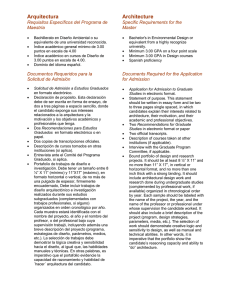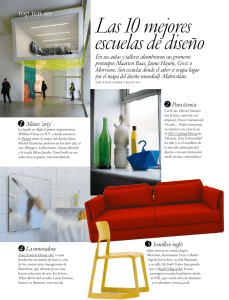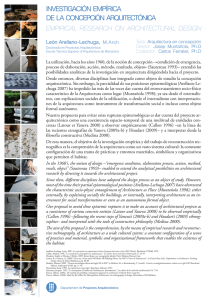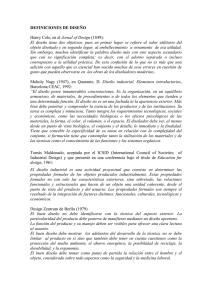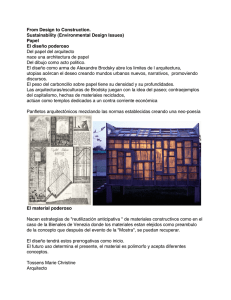c onference # 09
Anuncio
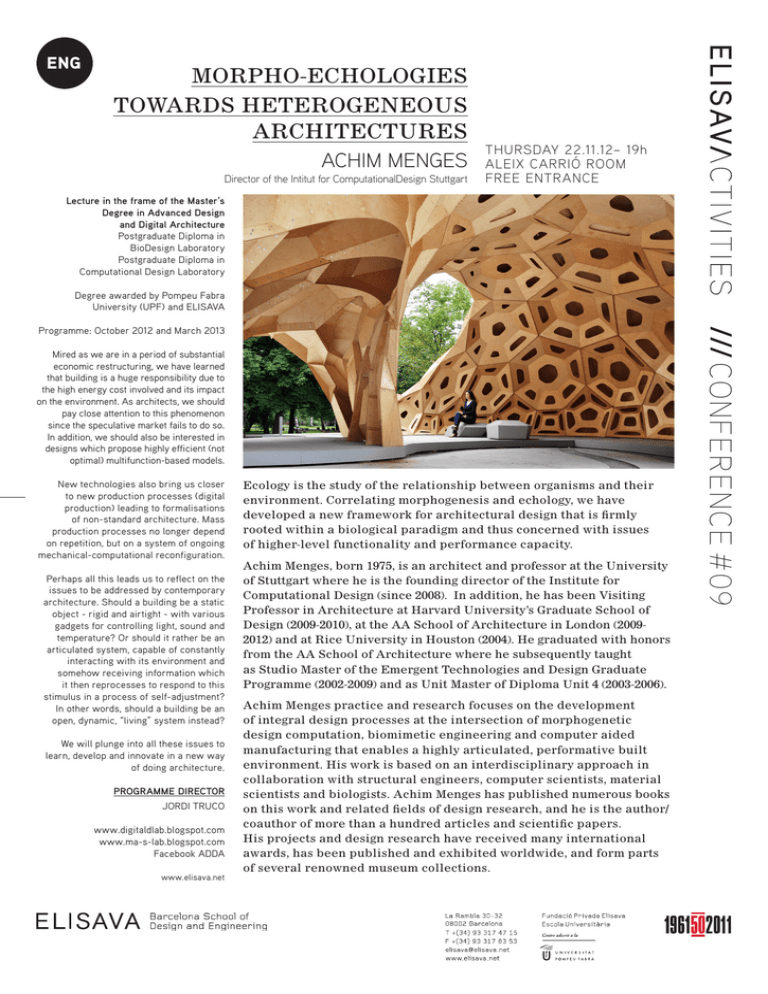
ENG MORPHO-ECHOLOGIES TOWARDS HETEROGENEOUS ARCHITECTURES ACHIM MENGES Director of the Intitut for ComputationalDesign Stuttgart THURSDAY 22.11.12– 19h ALEIX CARRIÓ ROOM FREE ENTRANCE Lecture in the frame of the Master’s Degree in Advanced Design and Digital Architecture Postgraduate Diploma in BioDesign Laboratory Postgraduate Diploma in Computational Design Laboratory Degree awarded by Pompeu Fabra University (UPF) and ELISAVA Programme: October 2012 and March 2013 New technologies also bring us closer to new production processes (digital production) leading to formalisations of non-standard architecture. Mass production processes no longer depend on repetition, but on a system of ongoing mechanical-computational reconfiguration. Perhaps all this leads us to reflect on the issues to be addressed by contemporary architecture. Should a building be a static object - rigid and airtight - with various gadgets for controlling light, sound and temperature? Or should it rather be an articulated system, capable of constantly interacting with its environment and somehow receiving information which it then reprocesses to respond to this stimulus in a process of self-adjustment? In other words, should a building be an open, dynamic, “living” system instead? We will plunge into all these issues to learn, develop and innovate in a new way of doing architecture. PROGRAMME DIRECTOR JORDI TRUCO www.digitaldlab.blogspot.com www.ma-s-lab.blogspot.com Facebook ADDA www.elisava.net Ecology is the study of the relationship between organisms and their environment. Correlating morphogenesis and echology, we have developed a new framework for architectural design that is firmly rooted within a biological paradigm and thus concerned with issues of higher-level functionality and performance capacity. Achim Menges, born 1975, is an architect and professor at the University of Stuttgart where he is the founding director of the Institute for Computational Design (since 2008). In addition, he has been Visiting Professor in Architecture at Harvard University’s Graduate School of Design (2009-2010), at the AA School of Architecture in London (20092012) and at Rice University in Houston (2004). He graduated with honors from the AA School of Architecture where he subsequently taught as Studio Master of the Emergent Technologies and Design Graduate Programme (2002-2009) and as Unit Master of Diploma Unit 4 (2003-2006). Achim Menges practice and research focuses on the development of integral design processes at the intersection of morphogenetic design computation, biomimetic engineering and computer aided manufacturing that enables a highly articulated, performative built environment. His work is based on an interdisciplinary approach in collaboration with structural engineers, computer scientists, material scientists and biologists. Achim Menges has published numerous books on this work and related fields of design research, and he is the author/ coauthor of more than a hundred articles and scientific papers. His projects and design research have received many international awards, has been published and exhibited worldwide, and form parts of several renowned museum collections. CONFERENCE #09 Mired as we are in a period of substantial economic restructuring, we have learned that building is a huge responsibility due to the high energy cost involved and its impact on the environment. As architects, we should pay close attention to this phenomenon since the speculative market fails to do so. In addition, we should also be interested in designs which propose highly efficient (not optimal) multifunction-based models. CAST MORPHO-ECHOLOGIES TOWARDS HETEROGENEOUS ARCHITECTURES ACHIM MENGES Director del Intitut for Computational Design Stuttgart JUEVES 22.11.12– 19h SAL A ALEIX CARRIÓ ENTRADA LIBRE Ponencia dentro del marco del Máster en Diseño Avanzado y Arquitectura Digital de ELISAVA Postgrado en BioDesign Laboratory Postgrado en Computational Design Laboratory Título expedido por la Universidad Pompeu Fabra y ELISAVA Inicio: Octubre 2012 y Marzo 2013 Las nuevas tecnologías nos facilitan nuevos procesos de producción (producción digital) que llevan a formalizaciones de la arquitectura no estándar. Los procesos de producción en masa ya no dependen de la repetición, sino de un sistema de reconfiguración mecánico-computacional continua. Probablemente, esta realidad nos lleve a reflexionar sobre los problemas a los que se enfrenta la arquitectura contemporánea. ¿Debería un edificio ser un objeto estático —rígido y hermético— con varios dispositivos que controlen la luz, el sonido y la temperatura? ¿O debería ser más bien un sistema articulado, capaz de interactuar continuamente con su entorno y, de algún modo, recibir información que luego reprocesará para responder a dicho estímulo en un proceso de autoajuste? En otras palabras, ¿debería un edificio ser un sistema abierto, dinámico, “vivo”? Nos adentraremos en todas estas cuestiones para aprender, profundizar e innovar en un nuevo modo de hacer arquitectura. DIRECCIÓN JORDI TRUCO www.digitaldlab.blogspot.com www.ma-s-lab.blogspot.com Facebook ADDA www.elisava.net La ecología es el estudio de la relación entre los organismos y su medio ambiente. Mediante la correlación entre morfogénesis y echology hemos desarrollado un nuevo marco para el diseño arquitectónico que está firmemente arraigado dentro de un paradigma biológico y por lo tanto trata de cuestiones de alto nivel de funcionalidad y capacidad de rendimiento. Achim Menges, nacido en 1975, es arquitecto y profesor de la Universidad de Stuttgart, donde es el director fundador del Institute for Computational Design (desde 2008). Además, ha sido profesor invitado en la Escuela de Arquitectura de la Universidad de Harvard de Diseño (2009-2010), en AA School of Architecture en Londres (2009-2012) y en la Universidad Rice en Houston (2004). Se graduó con honores de la AA School of Architecture donde posteriormente impartió Studio Master of the Emergent Technologies y Design Graduate Programme (2002-2009) y también Unit Master of Diploma Unit 4 (2003-2006). La práctica y la investigación de Achim Menges se centra en el desarrollo de los procesos de diseño integral en la intersección del cálculo de diseño morfogenético, ingeniería biomimética y fabricación asistida por ordenador que permite un entorno articulado y construido. Su trabajo se basa en un enfoque interdisciplinario, en colaboración con ingenieros estructurales, informáticos, científicos especialistas en materiales y biólogos. Achim Menges ha publicado numerosos libros sobre esta temática y trabajos relacionados con la investigación en diseño, y es autor/coautor de más de un centenar de artículos y trabajos científicos. Sus proyectos de investigación y diseño han recibido numerosos premios internacionales, han sido publicados y exhibidos en todo el mundo, y forman parte de colecciones de museos de renombre. CONFERENCIA #09 Atrapados en un período de importante reestructuración económica, hemos aprendido que la construcción supone una enorme responsabilidad debido a su alto coste energético y su impacto en el medio ambiente. Como arquitectos, debemos prestar mucha atención a este punto, ya que el mercado especulativo no lo hace. También tenemos que priorizar los diseños que proponen modelos de base multifunción altamente eficientes (no óptimos).
